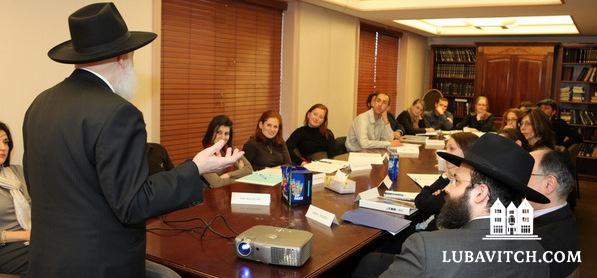(lubavitch.com) Tomorrow’s Jewish leaders, now training in a specialized grad school program, received an intense, behind the scenes look at Lubavitch World Headquarters last week.
Heads of some of Chabad-Lubavitch’s most influential programs silenced their Blackberries and shared their strategies for building Jewish life with sixteen students of the Hornstein Professional Leadership Program at Brandeis University.
“Chabad is the largest and fastest growing Jewish organization in the world. If you aspire to Jewish leadership, you must understand that the Chabad experience is more than sharing a Shabbat dinner with your local Chabad rabbi. You need to understand the international scope of Chabad and the passion that drives each shliach,” said Professor Mark I. Rosen, a Hornstein faculty member and director of field experience programs, who leads the seminar.
The students are enrolled in a dual degree program that will earn them a master’s degree in Jewish professional leadership and one in either non-profit management or public policy. Their trip to Lubavitch World Headquarters is part of the annual Starr Seminar Program, a five-day encounter with major Jewish organizations.
Rabbi Yehuda Krinsky, Chairman of Machne Israel and Merkos, respectively the social services and educational divisions of Lubavitch, greeted the students and spoke of Chabad’s development under the leadership of the Lubavitcher Rebbe. He spoke of his long experience working for the Rebbe, reminding the students that Jewish leadership is in fact, a function of servitude rather than glory, as exemplified by the Rebbe’s leadership.
“You need to care, to have real love for every individual, and truly put yourself in the service of the people,” he told them.
Students scribbled facts and figures in their notebooks as Baila Olidort, editor-in-chief of Lubavitch News Service, focused on the movement’s activities, charting the growth of Chabad centers worldwide over a 20 year period, and its impact on Jewish engagement. Reviewing educational initiatives developed at Lubavitch Headquarters to supplement and streamline the network’s educational programs, she highlighted the explosive growth of the Rohr Jewish Learning Institute’s (JLI) satellite divisions as a case in point.
On a their Wonka-esque journey, the students made their way through the hallways of 770 Eastern Parkway and its offices nearby. They scooted by a bevy of programmers and humming hard drives to examine the offices of Chabad.org and Jewish Educational Media, before meeting with the director of Chabad’s educational office, Rabbi Nochem Kaplan, and Rabbi Moshe Chaim Dubrowsky of Chabad-on-Campus.
“We worked to give the students a fundamental understanding of why we do what we do, and how we serve Jewish people all over the world, from cyberspace to a physical space, like the Jewish Children’s Museum,” said Rabbi Avraham Berkowitz of Lubavitch Headquarters.
Across the street of Lubavitch Headquarters, the group met with Devorah Halberstam who told them about her son’s death at the hands of a terrorist and how it galvanized her to bring the dream of the Children’s Museum to fruition.
“Her painstaking honesty and emotional testimony moved many in our cohort to tears,” said Alexandria Fanjoy, a Hornstein fellow from Toronto. “To have been through the trials in her life and to come out the other side with stronger belief …To have a community you can keep such faith in, who can offer you the religious and social support to get through the death of a child – that is inexplicably special.”
Fanjoy also enjoyed the dinner in the home of Rabbi Shmaya Krinsky. Over homestyle cooking, Batya Lisker of Lubavitch Headquarters who coordinated the Brandeis tour, shared inspirational anecdotes adding a spiritual component to the experience. As talk turned from one topic to another, from the serious and sublime to the lighthearted, the other face of Chabad, familiar to students and Jewish people around the globe, emerged.
“Chabad’s ability to be accepting of other people’s Jewish beliefs and practices, while simultaneously adhering to their own belief system is the basis of their success,” Fanjoy told Lubavitch.com.
“To have intimate conversations with people whom previously we may have considered to have very little in common with, is indicative of the unifying power that remains within an increasingly disparate Jewish society.”
Photos by Menachem Kozlovsky

Be the first to write a comment.